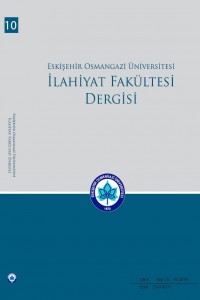Abstract
Themistius felsefe tarihinde Aristotelesçi
Ruh Üzerine geleneği bağlamında önemli bir yerde durmaktadır. Themistius
Aristotles’in Ruh Üzerine adlı eserine bir şerh yazmış, bu şerh
Arapça’ya çevrilmiş ve ruh teorileri bağlamında İslâm Felsefesi alanında etkili
olmuştur. Themistius faal aklı aşkın veya ilahi bir içerikten ziyade insana ait
bir yeti olarak vasıflandırmıştır. Bu yorum, faal aklı Tanrı olarak yorumlayan
İskender’in anlayışına ve ilahi kimlikli yorumlayan şarihlerin görüşlerine
karşıt bir durumdur. Themistius’a göre faal akıl bilkuvve akla iştirak etmekte,
onun üzerinde hareket etmekte ve bilkkuvve düşünceleri bilfiil hale
getirmektedir. Fakat bunu dışardan bir güç olarak değil insan ruhunun en üst
formu olarak yapmaktadır. Böylelikle faal akıl ruhun ve maddi aklın nihai ereği
konumundadır. Ruha dışardan gelen bir karışım değildir. Faal akıl Tanrı veya
Tanrısal bir gücün insan ruhu üzerindeki bir uzantısı değildir. Themistius’a
göre faal akıl birdir; hatta bilkuvve, bilfiil ve faal akıl ayrımları bir
çokluğa değil aynı birliğin varyantlarına işaret etmektedir. Böylelikle
Themistius Aristotles’in Ruh Üzerine’sini ruhun birliği bağlamında
Eflatuncu bir bakış açısıyla yorumlamıştır.
References
- Aristoteles, Ruh Üzerine, çev. Zeki Özcan, İstanbul: Alfa Yayıncılık, 2000.
- Davidson, Herbet A., AlFârâbî, Avicenna and Averroes on Intellecet, Oxford; Oxfor University Press, 1992.
- Feldman, Seymour, “Gersonides on the Possibility of Conjunction with Agent Intellect” AJS Review, Vol.3. (1978), s. 103, pp.99-120.
- Lyons, M.C., “An Arabic Translation of the Commentary o fThemistius”, Bulletin of the School of oriental and African Studies, Vol.17, No:3, London-1955, ss. 426-435.
- Platon, Gorgias, çev. Sema R. Güzelşen- Mehmet Rifat., İstanbul; Hürriyet Yayınları, 1975.
- Themistius, “Paraphrase of De Anima, 3.4-8,” Translated, Robert B. Todd, Frederic M. Schroeder and Robert B. Two Greek Aristotelian Commentators on Intellect, Toronto; Pontifical Instıtute of Mediaeval Studies, 1990, ss. 77-133.
- Todd, Robert B., “Themistius” Catalogus translationum Et Commentariorum: Mediaeval and Renaissence Latin translations and Commentaries, Vol. VIII, Ed. Virginia Brown, Washington, D.C.; The Catholic University of America, Press- 2003, s.59. ss.57-101.
- Tornay, Stephen Chak, “Averroes Doctrine of the Mind”, The Philocophical Review,Vol. 52, May, 1943, ss.270-288.
Abstract
Themistius stands in an important place in the history of philosophy in
context of the tradition of commentary of Aristotle’s De Anima. Themistius
wrote a commentary on Aristotle’s De Anima, This Commentary translated
to Arabic and Themistius effected theories on spirits in Islamic Philosophy by
this Commentary. Themistius has characterized agent intellect as human power
rather than transcendent or divine content. This type of commentary about agent
intellect contrary to Alexander of Aphrodisias’ ideas as agent intellect should
be God and commentators interpreted agent intellect should be extension of a
transcendent entity in human mind. According to Themistius, agent intellect
participated in human material intellect, leading to human material intellect,
and converting to potential intelligible to actual intelligible. However, agent
intellect performing these issues as superior form of human spirit not as an
external power. Thus, agent intellect is the ultimate form of soul and
potential mind. Agent intellect is not a mixture from the outside. Agent
intellect is not God or is not an extension of a divine power on the human
soul. According to Themistius, Potential intellect and Agent intellect is not
many but One, in fact potential intellect, actual intellect, and agent
intellect are not reference to multitude but they are oneness. Thus, Themistius
interpreted the Aristotle’s De Anima on the basis of a Platonic view in
the context of spiritual unity.
References
- Aristoteles, Ruh Üzerine, çev. Zeki Özcan, İstanbul: Alfa Yayıncılık, 2000.
- Davidson, Herbet A., AlFârâbî, Avicenna and Averroes on Intellecet, Oxford; Oxfor University Press, 1992.
- Feldman, Seymour, “Gersonides on the Possibility of Conjunction with Agent Intellect” AJS Review, Vol.3. (1978), s. 103, pp.99-120.
- Lyons, M.C., “An Arabic Translation of the Commentary o fThemistius”, Bulletin of the School of oriental and African Studies, Vol.17, No:3, London-1955, ss. 426-435.
- Platon, Gorgias, çev. Sema R. Güzelşen- Mehmet Rifat., İstanbul; Hürriyet Yayınları, 1975.
- Themistius, “Paraphrase of De Anima, 3.4-8,” Translated, Robert B. Todd, Frederic M. Schroeder and Robert B. Two Greek Aristotelian Commentators on Intellect, Toronto; Pontifical Instıtute of Mediaeval Studies, 1990, ss. 77-133.
- Todd, Robert B., “Themistius” Catalogus translationum Et Commentariorum: Mediaeval and Renaissence Latin translations and Commentaries, Vol. VIII, Ed. Virginia Brown, Washington, D.C.; The Catholic University of America, Press- 2003, s.59. ss.57-101.
- Tornay, Stephen Chak, “Averroes Doctrine of the Mind”, The Philocophical Review,Vol. 52, May, 1943, ss.270-288.
Details
| Primary Language | Turkish |
|---|---|
| Subjects | Religious Studies |
| Journal Section | Articles |
| Authors | |
| Publication Date | March 15, 2019 |
| Submission Date | January 31, 2019 |
| Acceptance Date | March 11, 2019 |
| Published in Issue | Year 2019 Volume: 6 Issue: 10 |
Journal of Eskisehir Osmangazi University Faculty of Theology (ESOGUIFD) is licensed under a Creative Commons Attribution Non-Commercial 4.0 International license.


